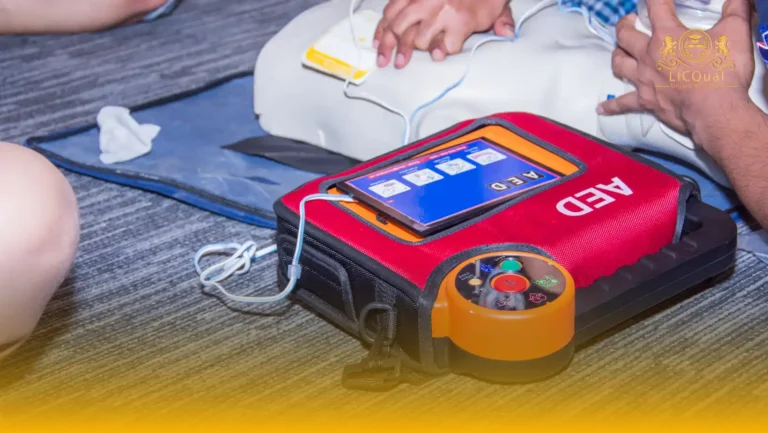The LICQual Level 3 Certificate in Neurology (Cert Neurology) is a specialised qualification designed for healthcare professionals seeking to deepen their expertise in the field of neurology. This qualification is not intended for fresh candidates but is aimed at experienced practitioners who wish to enhance their career prospects, expand their knowledge, and strengthen their Continuing Professional Development (CPD).
Learners undertaking this course will gain a comprehensive understanding of neurological disorders, diagnostic procedures, and treatment approaches. The programme combines theoretical knowledge with practical insights, enabling learners to apply their skills effectively in clinical or healthcare settings. Topics include the structure and function of the nervous system, common neurological conditions, patient assessment, and the latest advances in neurological care.
Centres delivering this qualification are required to meet high standards to ensure quality learning outcomes. This includes employing competent and qualified staff with relevant professional experience, providing access to up-to-date teaching materials, and ensuring learners have the resources necessary to succeed. Well-equipped facilities and structured support mechanisms are essential to enable learners to develop both theoretical understanding and practical competencies.
By completing the LICQual Level 3 Certificate in Neurology, learners will be well-positioned to take on more advanced responsibilities within their profession, improve patient care, and demonstrate a commitment to ongoing professional growth. This qualification is ideal for healthcare practitioners, clinical staff, and other professionals seeking to specialise in neurology while enhancing their professional credibility and career opportunities.
Course Overview
Qualification Title
LICQual Level 3 Certificate in Neurology (Cert Neurology)
Total Units
6
Total Credits
24
GLH
120
Qualification #
LICQ2200842
Qualification Specification
To enroll in the LICQual Level 3 Certificate in Neurology (Cert Neurology), applicants must meet the following criteria:
|
Qualification# |
Unit Title |
Credits |
GLH |
|---|---|---|---|
|
LICQ2200842-1 |
Introduction to Neurology |
4 |
20 |
|
LICQ2200842-2 |
Neurological Assessment and Diagnosis |
4 |
20 |
|
LICQ2200842-3 |
Common Neurological Disorders |
4 |
20 |
|
LICQ2200842-4 |
Neuropharmacology and Treatment Approaches |
4 |
20 |
|
LICQ2200842-5 |
Neurological Emergencies and Critical Care |
4 |
20 |
|
LICQ2200842-6 |
Professional Practice and Ethics in Neurology |
4 |
20 |
By the end of this course, learners will be able to:
Unit 1: Introduction to Neurology
Learning Outcomes:
- Understand the fundamental principles and scope of neurology in healthcare
- Identify the structure and function of the central and peripheral nervous systems
- Explain key neuroanatomy and neurophysiology concepts
- Recognise common terminology and clinical concepts in neurology
- Describe the role of neurologists and allied healthcare professionals in patient care
Unit 2: Neurological Assessment and Diagnosis
Learning Outcomes:
- Conduct effective neurological examinations and patient assessments
- Take comprehensive patient histories and evaluate neurological symptoms
- Identify and interpret neurological signs through clinical observation
- Understand the use of diagnostic tools, including MRI, CT, EEG, EMG, and lumbar puncture
- Record and analyse clinical findings accurately to support diagnosis
Unit 3: Common Neurological Disorders
Learning Outcomes:
- Describe the causes, risk factors, and prevalence of common neurological disorders
- Identify symptoms, progression, and impact of conditions such as stroke, epilepsy, Parkinson’s disease, and multiple sclerosis
- Evaluate the effect of neurological conditions on patients’ daily life and functional abilities
- Understand basic principles of care for patients with neurological disorders
- Apply knowledge to support patient management and clinical decision-making
Unit 4: Neuropharmacology and Treatment Approaches
Learning Outcomes:
- Explain the mechanisms of action and therapeutic effects of neurological medications
- Recognise the role of non-pharmacological interventions, including physiotherapy, occupational therapy, and cognitive rehabilitation
- Develop patient-centred care plans and treatment strategies
- Monitor and evaluate the effectiveness of neurological treatments
- Apply safe and ethical practices in administering treatments
Unit 5: Neurological Emergencies and Critical Care
Learning Outcomes:
- Identify and respond to neurological emergencies, including stroke, seizures, and traumatic brain injury
- Apply emergency protocols and clinical decision-making in critical situations
- Understand the role of critical care support and multidisciplinary teamwork
- Ensure patient safety and ethical practices during emergency interventions
- Evaluate rapid intervention strategies to improve patient outcomes
Unit 6: Professional Practice and Ethics in Neurology
Learning Outcomes:
- Demonstrate professional responsibilities and ethical standards in neurological practice
- Maintain patient confidentiality and obtain informed consent
- Apply best practices in record keeping, documentation, and reporting
- Engage in continuous professional development (CPD) in neurology
- Use evidence-based practice and incorporate emerging neurological research into clinical care
The LICQual Level 3 Certificate in Neurology (Cert Neurology) is designed for healthcare professionals, students, and individuals who want to strengthen their knowledge of the nervous system and neurological disorders. This Level 3 Neurology qualification is ideal for those seeking career advancement, CPD accreditation, or a pathway into specialized healthcare roles. Whether you are already working in a clinical setting or planning to enter the healthcare sector, this course provides the skills, recognition, and confidence to stand out.
1. Healthcare Professionals Seeking Specialization
- Nurses aiming to expand their expertise in neurological care
- Allied health staff supporting patients with neurological conditions
- Clinicians looking to enhance diagnostic and treatment knowledge
- Professionals seeking CPD-accredited neurology training
- Staff aiming for promotions in hospitals or rehabilitation centers
2. Medical and Healthcare Students
- Students pursuing medicine, nursing, or biomedical sciences
- Learners preparing for postgraduate studies in neurology or neuroscience
- Graduates seeking a recognized Level 3 qualification to boost CVs
- Students interested in brain function, spinal cord health, and diagnostics
- Individuals aiming to bridge academic knowledge with clinical practice
3. Neurology and Rehabilitation Staff
- Physiotherapists working with neurological rehabilitation patients
- Occupational therapists supporting recovery from brain injuries
- Speech and language therapists treating neurological impairments
- Rehabilitation assistants seeking structured neurology training
- Professionals aiming to improve patient-centered neurological care
4. Public Health and Community Healthcare Workers
- Professionals involved in neurological awareness and outreach programs
- Staff supporting patients with dementia, epilepsy, or stroke recovery
- Workers in rural or underserved healthcare systems
- Public health officers seeking CPD-recognized neurology qualifications
- Community healthcare providers aiming to expand diagnostic knowledge
5. International Healthcare Professionals
- Overseas medical staff seeking UK-recognized neurology qualifications
- Professionals aiming to meet global healthcare standards
- Migrant healthcare workers preparing for career opportunities abroad
- Staff needing formal certification for regulatory compliance
- Learners looking for flexible, accessible online neurology training
6. Career Changers Entering Healthcare
- Professionals from science or psychology backgrounds transitioning into healthcare
- Individuals seeking a structured entry into neurology and diagnostics
- Career changers aiming for stable, in-demand healthcare roles
- Learners motivated by long-term career security in medical fields
- Adults seeking accredited qualifications for professional credibility
7. Research and Academic Professionals
- Researchers exploring neurological disorders and brain health
- Academic staff supporting healthcare and neuroscience programs
- Professionals contributing to neurology-focused research projects
- Educators seeking CPD in neurological science and diagnostics
- Scholars aiming to expand expertise in applied neuroscience
- Accredited Training Facilities: Centres must hold valid accreditation to deliver Level 3 neurology qualifications according to international standards.
- Qualified and Experienced Staff: Instructors should have relevant qualifications and practical experience in neurology or related healthcare fields.
- Access to Learning Resources: Centres must provide learners with up-to-date textbooks, digital learning materials, and access to clinical or laboratory facilities where applicable.
- Health and Safety Compliance: Centres must comply with all local and international health and safety regulations, including laboratory and clinical safety standards.
- Assessment and Evaluation Facilities: Centres should have proper arrangements for practical and theoretical assessments, ensuring accurate record keeping and reporting.
- Support for Learners: Centres must provide guidance, mentoring, and structured support to help learners achieve their learning outcomes.
- CPD Encouragement: Centres should promote continuous professional development through workshops, seminars, and access to current research in neurology.
- Technical and IT Support: Adequate infrastructure must be available to support online learning, digital assessments, and access to learning platforms.
Assessment and Verification
All units within this qualification are subject to internal assessment by the approved centre and external verification by LICQual. The qualification follows a criterion-referenced assessment approach, ensuring that learners meet all specified learning outcomes.
To achieve a ‘Pass’ in any unit, learners must provide valid, sufficient, and authentic evidence demonstrating their attainment of all learning outcomes and compliance with the prescribed assessment criteria. The Assessor is responsible for evaluating the evidence and determining whether the learner has successfully met the required standards.
Assessors must maintain a clear and comprehensive audit trail, documenting the basis for their assessment decisions to ensure transparency, consistency, and compliance with quality assurance requirements.







